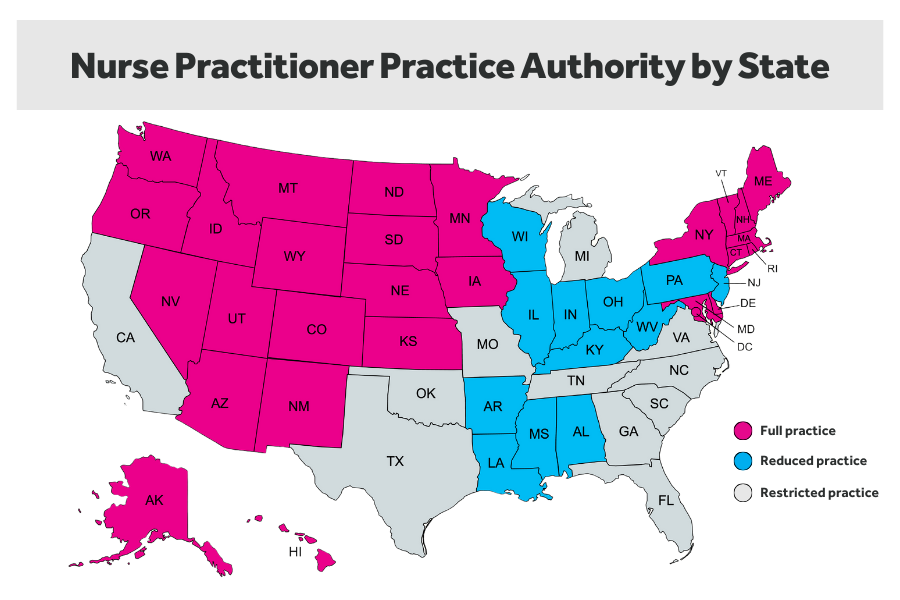Guide to Full Practice Authority for Nurse Practitioners

Did you know that your job as a nurse practitioner (NP) can differ significantly across the U.S.? Each state has its own set of rules and regulations regarding the role of an NP. States with full practice authority for nurse practitioners offer opportunities to practice independently — you can diagnose, order tests, and prescribe medications. But in restricted practice authority states, your autonomy is more limited — you’ll need to work with a supervising doctor.
This article is your go-to guide to navigate the NP landscape across the country helping you to decide where to build your career and maximize your practice potential.
What Is Full Practice Authority for Nurse Practitioners?
There are certain states where NPs can practice on their own, known as full-practice authority (FPA) states. Here, you won’t need supervision or contractual obligations from physicians or the state medical board for licensure. So if you’ve ever dreamed about working as a primary healthcare provider or opening your own practice, FPA states offer the widest scope of practice for your nursing aspirations.
Map of NP Practice Authority
There are three levels of autonomy a state assigns NPs that define their scope of practice: full practice, reduced practice, and restricted practice. Find your state below to determine how the differences in NP practice authority by state might impact your nursing practice.

1. Full-Practice Authority
There are currently 28 FPA states in the U.S. Here, you can practice autonomously and perform all your job duties without having to answer to a higher authority aside from the state board of nursing. Full-practice states include:
- Alaska
- Arizona
- Colorado
- Connecticut
- Delaware
- District of Columbia
- Hawaii
- Idaho
- Iowa
- Kansas
- Maine
- Maryland
- Massachusetts
- Minnesota
- Montana
- Nebraska
- Nevada
- New Hampshire
- New Mexico
- New York
- North Dakota
- Oregon
- Rhode Island
- South Dakota
- Utah
- Vermont
- Washington
- Wyoming
2. Reduced-Practice Authority
In these states, one or more of your job duties are limited. Generally, you’ll only be able to utilize your full scope of practice when working for a larger medical entity, such as a hospital or clinic. You’ll also need to collaborate with a physician. Reduced-practice states include:
- Alabama
- Arkansas
- Illinois
- Indiana
- Kentucky
- Louisiana
- Mississippi
- New Jersey
- Ohio
- Pennsylvania
- West Virginia
- Wisconsin
3. Restricted-Practice Authority
In this case, your scope of practice is limited, even when practicing within a larger healthcare entity. You’ll need to work under the supervision, collaboration, or direction of a physician for certain aspects of patient care.
Keep in mind that even in states with restrictions, some NPs can attain full-practice authority. Some states, like California, offer pathways for experienced NPs to gain full-practice authority. However, this isn’t widely available for all NPs in the state, but it’s possible for those who meet specific requirements. Restricted-practice states are:
- California
- Florida
- Georgia
- Michigan
- Missouri
- North Carolina
- Oklahoma
- South Carolina
- Tennessee
- Texas
- Virginia
Benefits of Full Practice Authority for Nurse Practitioners
Practicing independently offers numerous benefits for NPs themselves, including expanded scope of practice and greater career flexibility. Other benefits include:
- Improved job satisfaction: Being able to practice independently and provide comprehensive care can boost career satisfaction for NPs.
- Reduced administrative burden: Not needing to report to a physician can simplify administrative duties for NPs.
- Higher earning potential: Expanding scope of practice and job responsibilities often results in higher salaries.
- Entrepreneurial opportunities: With the autonomy to work independently, NPs can own practices and achieve financial wellness.
- Career advancement: Practicing independently builds leadership skills, opening opportunities for NPs to work as clinical directors, nurse managers, or hospital administrators.
- Work-life balance: NPs can achieve a better balance between their professional responsibilities and personal lives with more control over their practice decisions.
Benefits of Full Practice Authority for the Healthcare System
With recent trends in nursing marked by staffing shortages, nationwide strikes, and burnout, there are a number of advantages that come with full practice authority for NPs. It empowers NPs to maximize their skills, provide comprehensive patient services, and reach underserved areas. Benefits include:
- Expanding NPs’ practice authority improves access to healthcare, especially in rural areas where physician shortages are common.
- Maximizing NP use can cut healthcare costs and tackle workforce shortages, bringing economic benefits to the state.
- Research shows that patients’ health outcomes in FPA states are similar to those overseen by physicians.
- Patients are highly satisfied with NP care, which emphasizes holistic approaches, education, and prevention.
There are also some arguments against full practice authority for nurse practitioners, which often revolve around patient safety, the quality of care provided, and whether expanding NP autonomy might shake up the traditional way doctors lead healthcare.
While opinions may differ, there is a place for everyone in the medical system. When every team member can utilize their skills and knowledge fully within their respective scopes of practice, the result is a well-rounded and effective healthcare system that meets the diverse needs of patients and communities.
What Is a Typical Nurse Practitioner Salary?
In the U.S., the average nurse practitioner salary is $128,490 per year. Your income can vary depending on your education, certifications, years of experience, and the state where you work.
If worries about job security weigh on your mind, rest assured knowing that the employment outlook is promising. Employment for this role is projected to grow 45% in the next decade, which is significantly faster than the average across all occupations. About 118,600 additional NPs are expected to join the workforce in that time.
Full Practice Authority for NPs: FAQs
Reduced vs. restricted practice NP — what’s the difference?
In reduced practice states, you’ll have some degree of autonomy but still require supervision, collaboration, or oversight from a physician. In restricted practice states, you’ll have limited autonomy and must work under the direct supervision of a physician.
Is Florida a full practice state for NP?
Florida is not an FPA state, but you can achieve autonomy as an advanced practice nurse by completing at least 3,000 clinical hours under the supervision of experienced physicians and fulfilling several board-approved courses.
Can a nurse practitioner practice in any state?
As an NP, you can work in different states, but you’ll need a license for each state. There’s currently no compact license alternative for nurse practitioners, but efforts are underway by the National Council of State Boards of Nursing (NCSBN) to establish a compact for APRNs.
Where can I find the latest NP independent practice states map?
The American Association of Nurse Practitioners (AANP) is your first source for the most up-to-date information. Laws change as more and more states make FPA agreements, and you can always keep track of those changes by viewing the AANP full practice authority map.
Ready for a Fulfilling Nursing Career?
Now that you know about full practice authority for nurse practitioners, it’s time to start building the career you desire. Check out the latest nurse practitioner jobs in the specialty, facility, and location you’re looking for.
